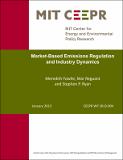| dc.contributor.author | Fowlie, Meredith | |
| dc.contributor.author | Reguant, Mar | |
| dc.contributor.author | Ryan, Stephen P. | |
| dc.date.accessioned | 2013-01-16T21:58:57Z | |
| dc.date.available | 2013-01-16T21:58:57Z | |
| dc.date.issued | 2013-01 | |
| dc.identifier.uri | http://hdl.handle.net/1721.1/76271 | |
| dc.description.abstract | We assess the long-run dynamic implications of market-based regulation of carbon dioxide emissions in the US Portland cement industry. We consider several alternative policy designs, including mechanisms that use production subsidies to partially offset compliance costs and border tax adjustments to penalize emissions associated with foreign imports. Our results highlight two general countervailing market distortions. First, following Buchanan (1969), reductions in product market surplus and allocative inefficiencies due to market power in the domestic cement market counteract the social benefits of carbon abatement. Second, tradeexposure to unregulated foreign competitors leads to emissions “leakage” which offsets domestic emissions reductions. Taken together, these forces result in social welfare losses under policy regimes that fully internalize the emissions externality. In contrast, market-based policies that incorporate design features to mitigate the exercise of market power and emissions leakage can deliver welfare gains. | en_US |
| dc.language.iso | en_US | en_US |
| dc.publisher | MIT CEEPR | en_US |
| dc.relation.ispartofseries | Working Papers;2013-004 | |
| dc.rights | An error occurred on the license name. | en |
| dc.rights.uri | An error occurred getting the license - uri. | en |
| dc.title | Market-Based Emissions Regulation and Industry Dynamics | en_US |
| dc.type | Working Paper | en_US |
| dc.identifier.citation | WP-2013-004 | en_US |
